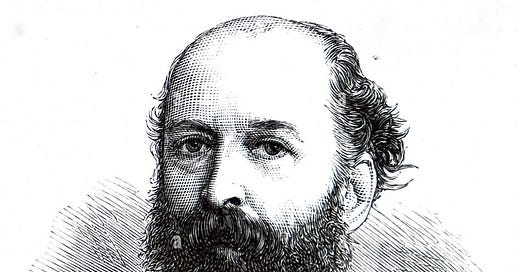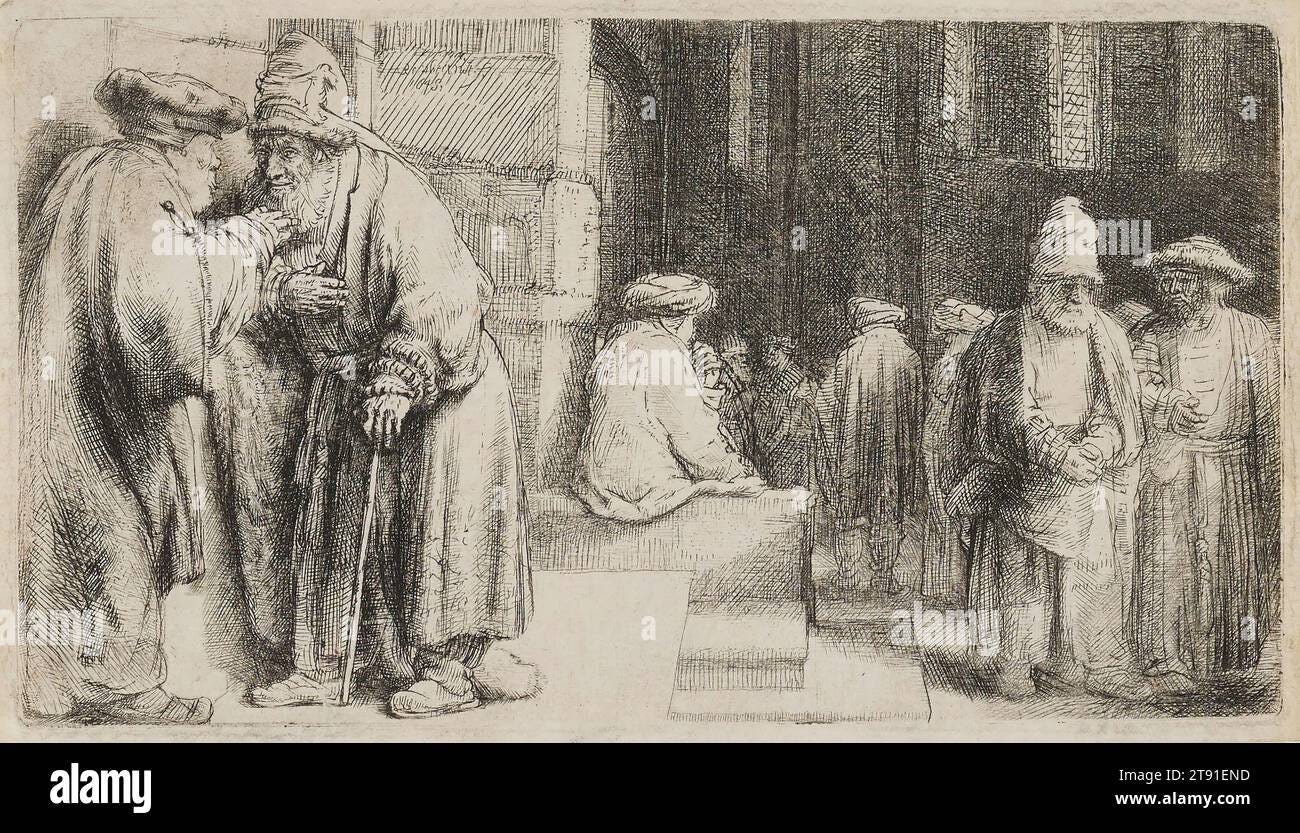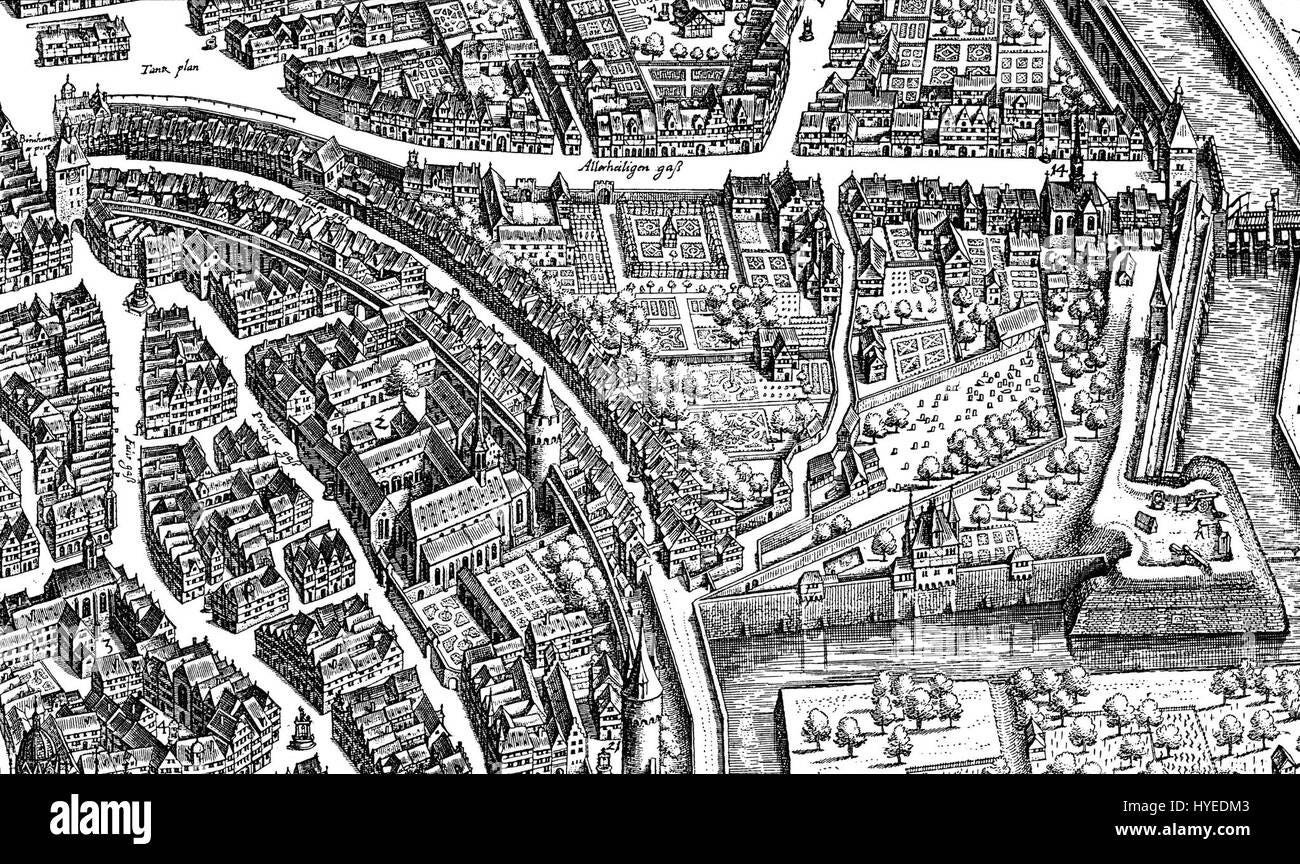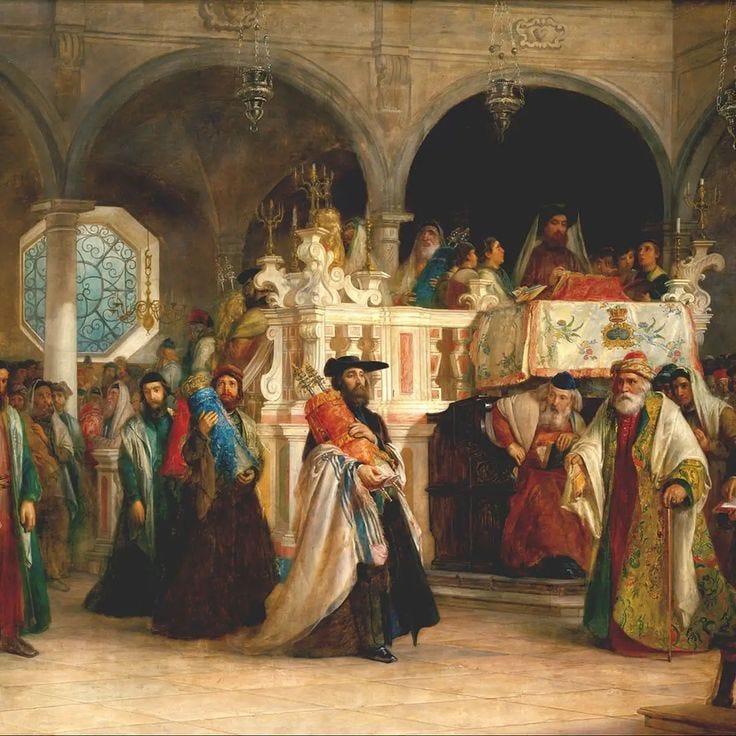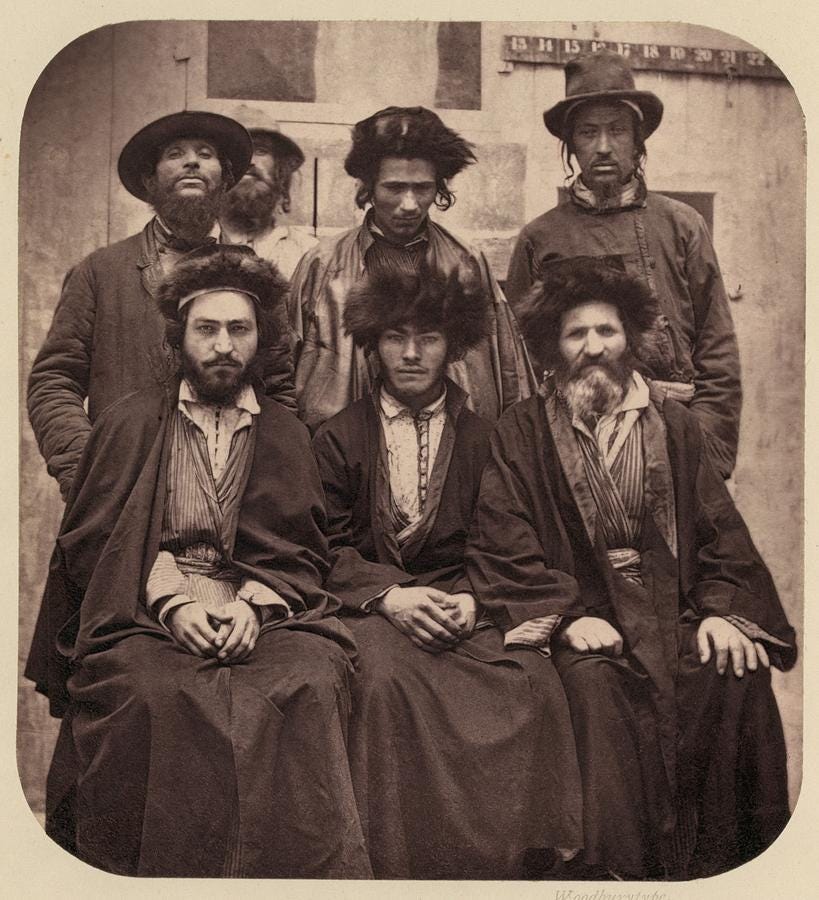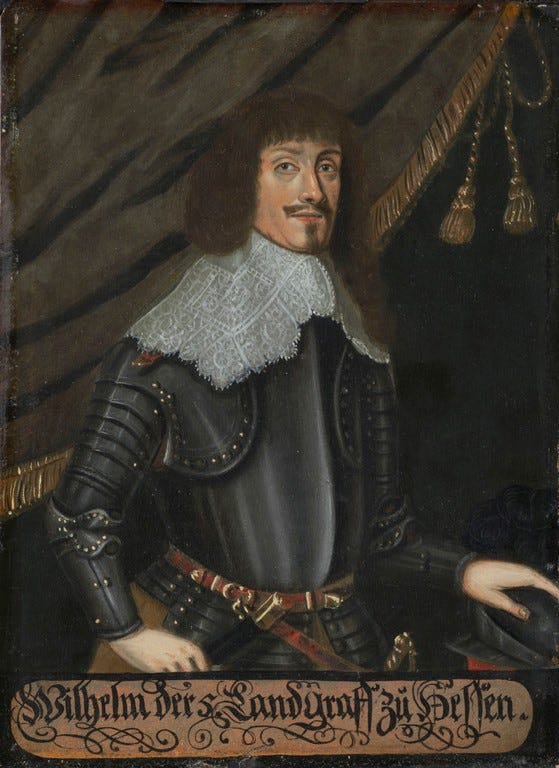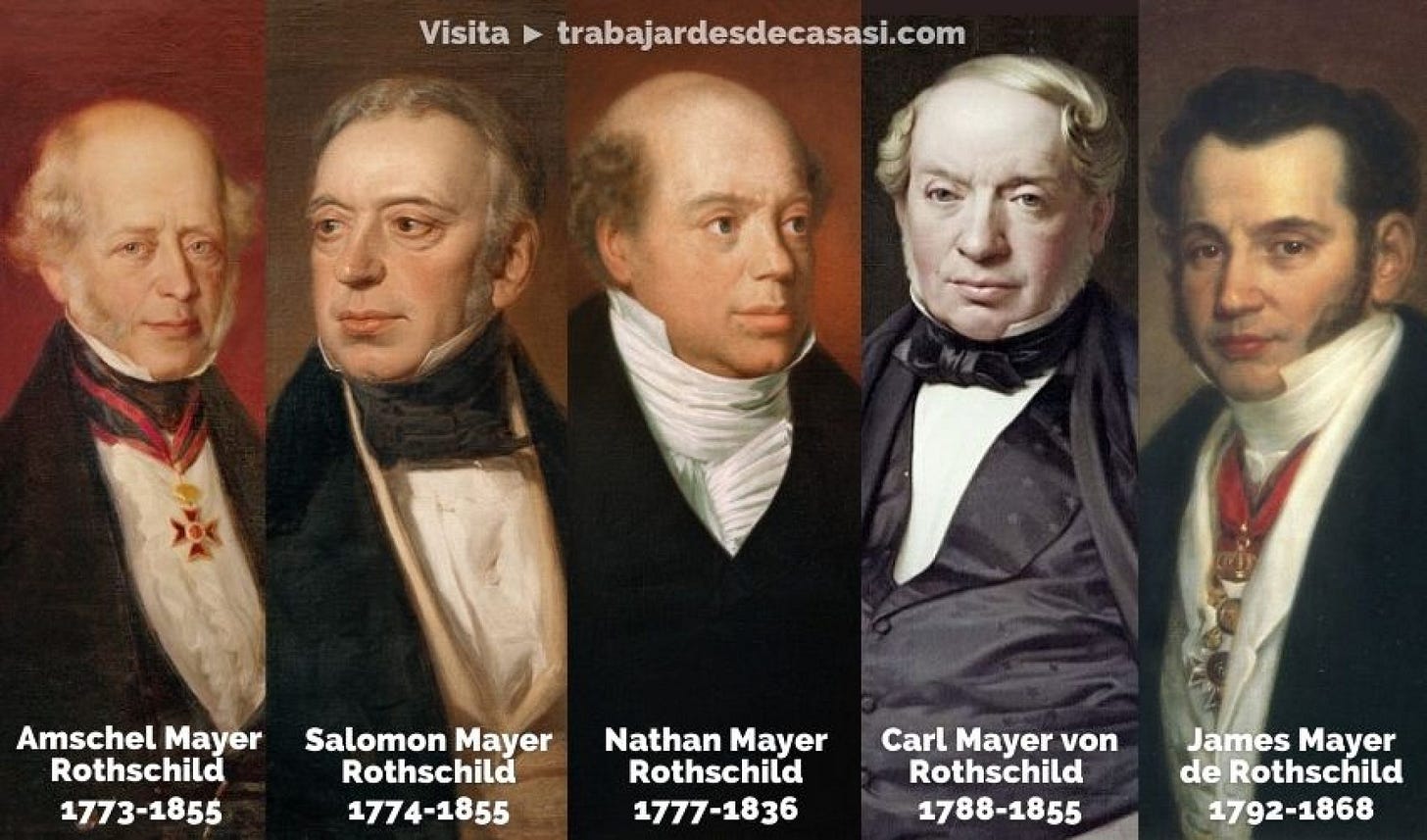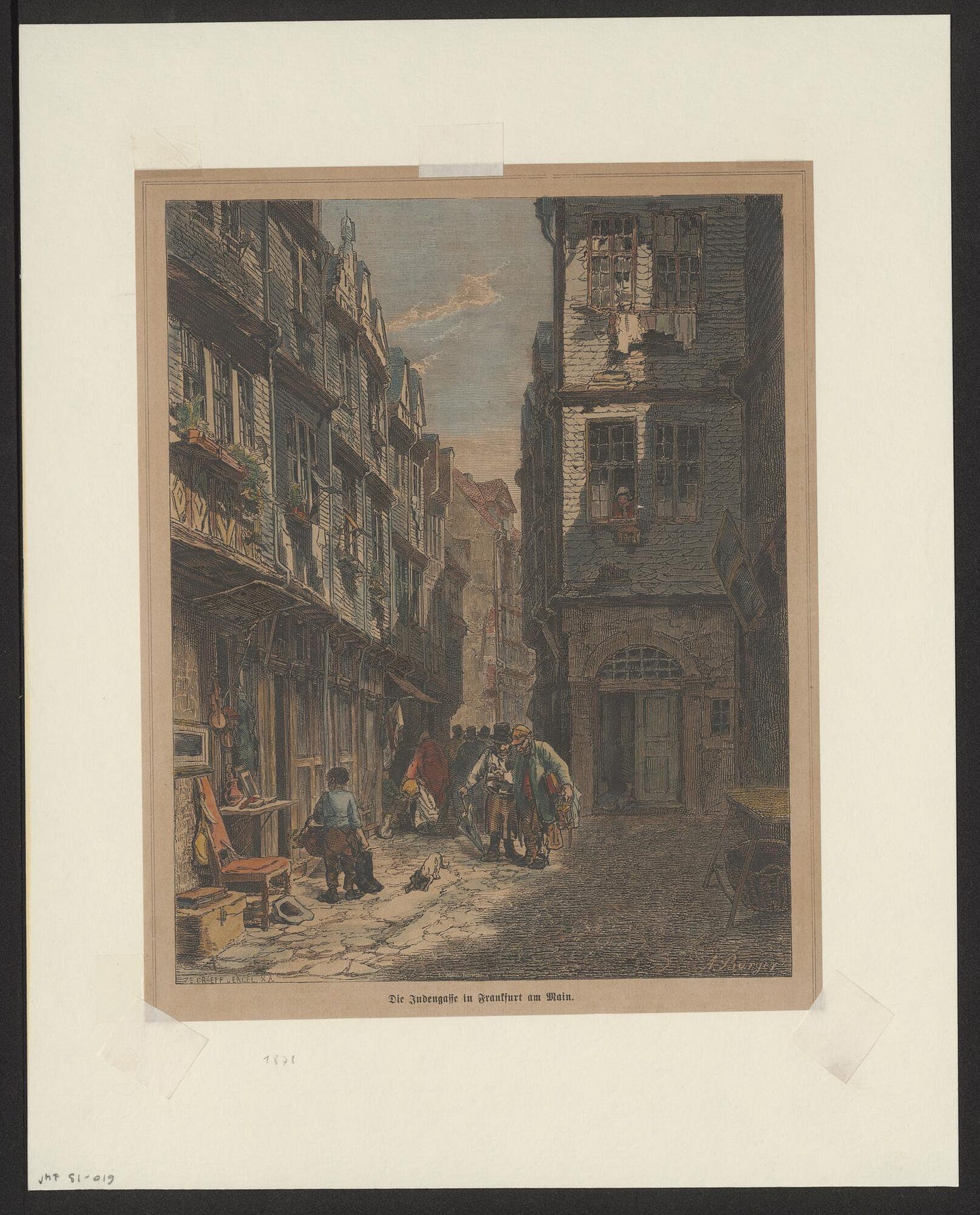Rothschild Origin Story: The Villain Was Made in the Ghetto
How Judengasse ghetto laws, princely debt, and Christian usury bans allowed Europe’s most brutal imperial banker to weaponise jewish exclusion and build a dynasty that gave the empire teeth.
Frankfurt in 1810 was a rich, busy city in central Europe. It was technically its own tiny state called a Free City. It wasn’t part of a kingdom. It made its own rules. But it still had to deal with bigger powers to deal with, like the Holy Roman Emperor, Napoleon, and later the German Confederation.Society was strictly divided. The most important divide was between Christians and Jews.
Christians were the majority. They controlled the laws, the council, the trades, the schools, the army, and the churches.
Jews were a small, separate group. They were legally shut out from most parts of society.
This prejudice was structured into law, housing, tax, movement, and religion. It was enforced by courts, police, and taxes.
Jews had to live in a cramped street called the Judengasse ("Jew Alley"). This was a walled-in ghetto.
They couldn’t live outside it without permission. They had curfews. They paid extra taxes just for being Jewish.
They couldn’t join guilds. They couldn’t vote or hold office. They were legally a separate group, like foreigners inside the city.
RELIGION: As law and identity
Christianity = the public religion.
Christian holidays were official. Laws were written with Christian moral rules. City meetings opened with prayers.
Judaism = tolerated but restricted. Jews couldn’t be full citizens because they didn’t accept Jesus.
Christian society saw Jews as a problem to be managed.
The cultural divide was deep.
Christian culture focused on public festivals, family life, guild pride, and church law.
Jewish culture was shaped by survival: religious schools, family networks, small private rituals, and a strong memory of exclusion.
Most Christians never set foot in the Judengasse. Most Jews knew how to survive in both worlds.
In medieval and early modern Europe, “usury” meant charging interest on a loan.
The Catholic Church condemned it as a sin based on passages in the Bible (e.g. “do not charge interest to your brother” – Deut. 23:19). Canon law made it illegal for Christians to lend at interest.
The logic:
Money was not supposed to "grow" on its own
Lending for profit was seen as exploiting the poor
Lending was morally acceptable only if it was charitable or interest-free
But as markets grew, trade expanded, cities rose and traders became more ruthless as they desired credit to compete.
Christians were banned from moneylending and second-hand dealing. To lend money with interest (usury), forbidden to Christians by Church law.In medieval and early modern Europe, “usury” meant charging interest on a loan.
The Loophole: Let Jews Do It
Jews were not bound by Christian canon law. They had long traditions of money handling and commercial law under Jewish halakha. Torah (Pentateuch) contains multiple laws on lending, interest, debt, and property.
Deuteronomy 23:19–20
לַנָּכְרִי תַשִּׁיךְ וּלְאָחִיךָ לֹא תַשִּׁיךְ
"To the nokhri you may lend with interest, but to your ach (brother) you shall not lend with interest."
The Hebrew word used for "foreigner" here is נָכְרִי (nokhri)
Which generally means
a person from outside the land,
a stranger,
a traveller to the land,
a temporary visitor.
Talmudic scholars took the text and split it:
→ “Brother” = fellow Jew
→ “Foreigner” = non-Jew → Interest okay?
In Talmudic law, rabbis took this phrase and codified it like this:
Lending with interest to fellow Jews =
❌ forbidden (civil and moral issue)Lending with interest to non-Jews =
✅ allowed (based on Deuteronomy 23:20)Lending to Jews using legal structures (e.g. heter iska) =
✅ okay, as long as it technically avoids calling it “interest”.(????????????????????????)
The heter iska (“business permit”) is a workaround used in religious Jewish finance to avoid the “no interest” rule when lending to Jews.
How it works (simplified):
Instead of lending money and charging interest…
You form a “
partnership” where profits areshared, but in practice, it works almost exactly like..
a loan with interest.
They pretend that technically this is not interest under Torah law (even if the financial effect is the same).
They treated “nokhri” as a new ‘legal category’, any non-Jew, not necessarily just a traveler or temporary outsider. This widened the permission into a general rule.
👉 This legal structure only exists because of strict bans on ribit. The move allowed Jewish moneylenders to participate in broader economies, especially in Christian Europe, where Christians were banned from usury.
(Side Note)
The moral framework of the Torah is about care, proximity, and protection, not religious tribalism.
The Torah’s rules about interest are about ethics within community. Literally saying don't exploit people you’re responsible for.
It does not say: “exploit people of a different religion.”
It does not say: “Jews can profit from non-Jews.”
It says: "If a traveling merchant or outsider stops by and wants food or supplies on credit? → You can charge a small markup or interest, because you take a risk to help them. ”
The later shift from “someone outside your village” → “all non-Jews” is not in the original language.
It's more like guideance on running an inn.
So later...
➡️ Resentment from indebted Christian merchants and artisans.
Anti-Jewish riots start to happen in Europe frequency and repeatedly and almost always tied to debt crises.
By the 1800s, a few Jewish families became very rich (like the Rothschilds). Christian elites both used them and feared them.
This led to conspiracy theories: that Jews “controlled finance” or were “secret rulers” when in fact 90% of Jews were still poor and locked out and a small number of families were consolidating both wealth and hatred behind the scenes.
Before 1800, the divide was mostly religious. After 1800, it became racialised.
Jews were seen not just as different believers, but as a different kind of human.
This happened in politics, science, and law.
Even when Jews converted to Christianity, many still weren’t accepted.
The idea of “Jewish blood” starts taking hold in this period. It will grow in the late 1800s and explode in the 1900s.
ELITE POWER STRUCTURES IN 1700s FRANKFURT
1. The City Council (Rat)
Dominated by wealthy Christian patrician families. Not elected by the public. Membership was passed down through elite families.
Controlled:
Taxes
Trade laws
Public order
Jewish affairs
Property rights
Decided who could live where, who could trade what, and who was allowed citizenship.
Saw Jews as:
A source of tax income
A threat to Christian tradesmen
A group to be watched and restricted
2. Christian Merchant Guilds
Controlled most legal trades (butchers, bakers, cloth makers, printers). Guilds lobbied city council to keep Jews locked out of professions.
Guilds feared:
Jewish competition in business
Jewish lenders owning Christian property via debt
3. Church Influence
Frankfurt was officially Christian, a Lutheran majority, some Catholic presence. The church taught that Jews were heretics.
Until 1806, Frankfurt owed allegiance to the Holy Roman Emperor.
The Emperor sometimes protected Jews (for taxes).
Then in 1806–1813 Napoleon took over and suddenly, Jews gained rights. Shortlived, from 1815 onward Frankfurt becomes the German Confederation and reversed Jewish emancipation under local Christian pressure.
4. Princes and Nobility
Owned large territories near Frankfurt (e.g. Hesse-Kassel, Hesse-Darmstadt).
Had debt problems due to war, court expenses, mercenary hiring.
Needed private bankers.
🪙 WHAT MAYER ROTHSCHILD ACTUALLY DID
Rothschild Built Trust with a Christian Prince (Wilhelm of Hesse-Kassel)
Elite Christians collected coins as political status symbols. Rothschild sold rare coins and medals to Wilhelm of Hesse-Kassel.
Rothschild used his deep coin knowledge to build a political relationship. Wilhelm became not just a client, but his protector. He broke one of the ghetto’s key constraints: Christian nobles weren’t supposed to deal with Jews directly on equal terms.
Christian merchant law in Frankfurt:
No Jews in merchant guilds
No Jews in Christian banks
No Jews in city halls or courts
Rothschild response: Build a private, kin-based finance system that sidestepped those rules:
Five sons in five cities
Moved capital through letters, bills, couriers
Kept operations off the Christian record books
Acted faster, more discreetly, and across borders
Rothschild Turned His Exclusion into Leverage
Being Jewish in Germany meant no political rights, no official trust, no guild or institutional protection
But that also meant:
No obligation to just one state
No ties to a single monarchy or religious order
Rothschild used marginalisation as flexibility. He moved funds quietly while Christian bankers were watched. He was trusted among other Jews with their own networks. His strategy meant he grew during war, when Christian banks feared collapse.
Mayer Amschel Rothschild and his sons weren’t just sitting in offices lending money to violent kings. They were playing those kings against each other
The Rothschild model is all about managing rivalries and engineering credibility:
Give a loan to State A
Leak news of it to State B
Make State B panic and offer better terms
Use both deals to expand market trust
Reinforce own role as indispensable, neutral, portable
This is more than brutish profit-seeking. It is calculated dependency creation.
Nathan Rothschild’s famous quote (likely paraphrased but accurate in effect):
“The time to buy is when there’s blood in the streets.”
They knew war created:
Need
Fear
Secrecy
Urgency
Which meant:
No regulation
High margins
Few questions asked
🔥 The Rage Beneath the Calculation
Mayer and his sons were men born under systems designed to crush them, watching the rulers who oppressed their people:
Beg them for capital
Blame them for influence
Use them as scapegoats
Rely on them when no one else could deliver
That produces
not trust but..
strategy.
They did not believe in loyalty to nations or kings because nations and kings had denied them humanity.
So their allegiance became:
To the network
To the family
To capital itself as the only defence
If a Christian crown needed funding, fine. But the Rothschilds were not “serving Europe.” They were profiting from the weakness of the very powers that called Jews parasites.
Rothschild Family Trusts and Global Wealth Holdings
Family Wealth and Trust Overview
The Rothschild family, a centuries-old banking dynasty, is known for vast wealth spread across multiple branches and generations. Much of this wealth is held through complex private trusts and family-owned holding companies rather than in any single entity.
Keep reading with a 7-day free trial
Subscribe to alimcforever to keep reading this post and get 7 days of free access to the full post archives.


